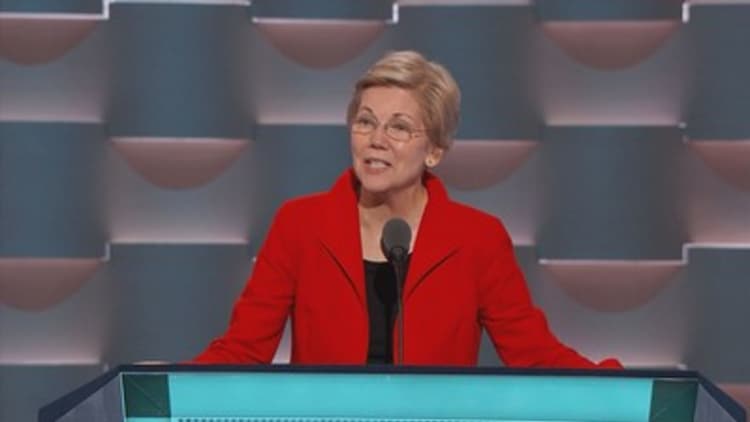The next Congress may be forced to revisit two key components of financial regulatory reform, making the outcome of Tuesday's elections potentially crucial to the future of a landmark Democratic legislative victory.
Federal courts this year have challenged the structure of an agency set up to protect consumers and the ability of regulators to designate financial institutions "too big to fail." Both bodies in question were established by the Dodd-Frank Wall Street Reform and Consumer Protection Act and have been at the center of bitter partisan rancor over how Washington polices the financial industry and business in the Obama era.
Despite challenges from Republicans, the work of rule-writing under Dodd-Frank has largely rested in the hands of regulators since being passed by a Democratic-controlled Congress in 2010. But the legal challenges threaten to punt these issues back to Capitol Hill, where they would be handled very differently based on which party controls Congress.
"Assuming that the rulings are upheld, that really forces the issue. Congress is going to have to do something," said Cornelius Hurley, a Boston University professor and former Federal Reserve official.
The Republicans are widely expected to maintain control of the House, but the Senate could swing to Democratic control. Sen. Mike Crapo of Idaho is expected to assume the Senate Banking Committee chairmanship if Republicans hold the chamber, while Ohio's Sherrod Brown will take the top spot if Democrats prevail.
Fight over consumer protection
The first issue concerns the Consumer Financial Protection Bureau, the agency tasked with protecting consumers that was established by Sen. Elizabeth Warren. Last month, a federal appeals court ruled the CFPB's structure is unconstitutional because there is too much power placed in the hands of the sole director.
This is a point Republicans have long argued. Still, Hurley believes the GOP's goal of dismantling the CFPB may no longer be politically viable in the wake of high-profile cases like Wells Fargo's bogus accounts scandal.
Conservative lawmakers generally prefer replacing the director with a commission. That was one of the suggestions House Financial Services Committee Chairman Jeb Hensarling of Texas put forward when he presented a plan to overhaul Dodd-Frank this summer. Under the plan, a five-member bipartisan commission would be tasked not only with protecting consumers, but promoting competitive markets.
While Democrats would likely be forced to accept a commission structure if the ruling holds, Brown would likely seek to leave the CFPB little changed beyond that issue, Hurley said. But Capo could exploit a review of the CFPB to address other GOP grievances with it.

The CFPB was devised to be automatically funded through the Federal Reserve system, but Capo could push for the agency's budget to be determined by annual appropriations, opening the door to a yearly referendum on the body.
"That could end up being be the battle royale," Hurley said.
It could take two years before the CFPB case works its way through the court system, including a possible Supreme Court hearing, said Alan Kaplinsky, leader of the consumer financial services division at law firm Ballard Spahr.
"I can't imagine that the next Congress is going to be at all receptive to jumping into the fray unless and until the courts have completely exhausted their review," he told CNBC
But Democrats and Republicans could find themselves at loggerheads before then should current CFPB Director Richard Cordray step down, Kaplinsky noted. Cordray is widely viewed as a candidate for Ohio governor in 2018.
If the White House and Congress are divided, that could set up a tough appointment battle.
Battle over 'too big to fail'
The second major issue Congress might have to address is the Financial Stability Oversight Council's ability to determine which financial institutions are big enough to be held to special standards.
In March, a U.S. judge ruled that regulators' decision to deem MetLife "too big to fail" was "arbitrary and capricious." That has thrown the entire designation process into question, Hurley said.
Republicans have made their stance on the issue clear.
Hensarling's plan proposed stripping the council of its authority to deem financial institutions "systemically important" altogether. It would also give these enterprises the option of holding high levels of capital instead of complying with liquidity standards enshrined in Dodd-Frank and the international agreement Basel III.

Republicans have sought to increase the threshold for deeming banks "systemically important" from $50 billion in assets to as much as $500 billion. They also favor dealing with any potential collapse of a systemically important institution through the bankruptcy code, rather than forcing them each year to submit "living wills" that must meet regulators' criteria and are subject to scrutiny.
Brown, on the other hand, would be unlikely to give big banks much relief. He co-authored a bill to break up big banks that did not make it into Dodd-Frank. He again put forward similar legislation in 2013. Hillary Clinton has promised to give regulators more authority to force "overly complex or risky" firms to "reorganize, downsize, or break apart."
But even if Clinton wins the White House and Democrats take the Senate, gridlock will likely continue at least through 2018 as Republicans rule in the House, said Chad Morganlander, portfolio manager at Stifel Nicolaus.
"If anything, the market could be pleasantly surprised by a pro-business stand," he told CNBC. "The Democrats have to come to the middle after the election to get any of their agenda passed. So I would not be surprised to see more of a shift — a slight shift — to business, similar to the Bill Clinton years."


